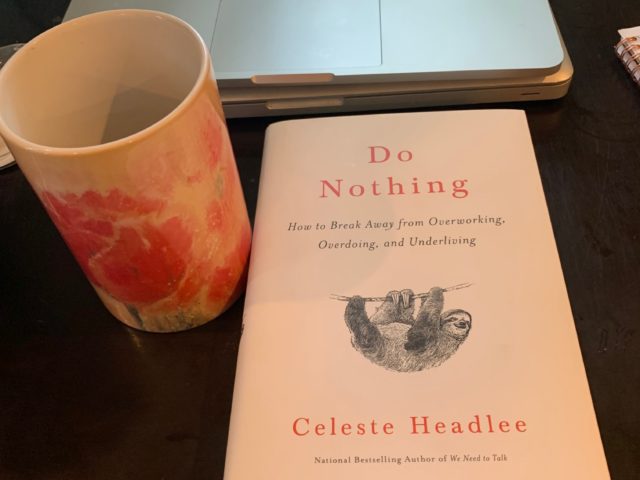In a few weeks, the Best of Both Worlds podcast will feature my interview with Celeste Headlee. Headlee, who I met on the conference speaking circuit, had been running a public radio show for years when she gave a TEDx talk on “10 ways to have a better conversation.” It has now been viewed almost 19 million times, which, as you can imagine, changed her life. She went from working very hard and making very little money to making quite a bit of money per speech…but feeling like she had less time than ever. This was not exactly how she thought success would play out.
Her new book, Do Nothing, talks about this trap — of how eventually her time became worth so much that “doing nothing” seemed absurd. You’ll have to listen to the episode for more on that (and buy her book!) but one point that I wanted to talk about here is her discussion of the difference between “laziness” and “idleness.”
These words have slightly different connotations. They’re listed for each other in dictionary definitions, but laziness is being unwilling to work or use energy. Idleness is a state of inactivity. It is slightly less pejorative. Headlee cites my research and that of others finding that we don’t work nearly as much as we think we do. But on the other hand, there is very little “idle” time in people’s lives where we’re not managing inputs. We have an hour of downtime, but we pick up the phone and clean out our inboxes or read tweets. Headlee gave herself a challenge to disconnect one day and then realized she had checked email 14 times. She didn’t even realize she was doing it until someone called her on it.
There’s been a lot written about the addictive nature of smart phones. I’m trying to be better about disconnecting and yet my screen time counts are still atrocious. Some is reading on the Kindle app but not all of it. A surprising (to me) amount is driven by texts. I love texting with friends and family but I’ve realized I don’t then put the phone down. I’ve lost half an hour doing…something. “Nothing” might have been better.
 Headlee suggests trying to “invest in leisure.” Her grandparents and great-grandparents, she notes, were busy and productive people, yet they still made time for serious hobbies. It’s something she’s been working on, and something we’re trying to do around here too. My 10-year-old and I built our Lego Yoda set, all 547 steps of it. And there’s something to be said for just sitting and thinking occasionally too. Sometimes the answers are more likely to be found there than in our inboxes.
Headlee suggests trying to “invest in leisure.” Her grandparents and great-grandparents, she notes, were busy and productive people, yet they still made time for serious hobbies. It’s something she’s been working on, and something we’re trying to do around here too. My 10-year-old and I built our Lego Yoda set, all 547 steps of it. And there’s something to be said for just sitting and thinking occasionally too. Sometimes the answers are more likely to be found there than in our inboxes.

Pictures of the Lego Yoda set please?
I’ll go back and try to add one to the post.
Love! Thanks for sharing!
This is interesting. I’ve noticed even my hobbies/downtime becoming “work”. Self care that is carefully curated to manage my stress, allowing me to do be ready to do more as soon as possible.
PS: doing my second time tracking this week. Toggl is a lifesaver, I can’t wait to play with the projects and tags more
Love this. The starts are aligning–ages of children, where we live, etc.–such that I can reinvest in some of my deepest childhood pleasures: outdoor lap swimming, tennis, and miles of trails for bike riding. I need to physically and mentally disconnect from the inputs. It never ends if you don’t control it.
I like my hobbies, like reading and knitting, but as Hanna notes above, sometimes those too become things that need to be productive. Finish reading that book so I can add it to my list and get “credit” for it; finish that knitting project so I have a gift for someone. Running clears my mind, but it’s also “add these miles to my log or do this workout to get faster.” These hobbies are still enjoyable, I just try to recognize when the productive feeling is creeping in.
I’m also embracing puttering as a form of idleness lately. Just letting my mind wander as I poke around my craft supplies or page through beautiful books for inspiration. Sometimes this involves a bit of tidying or organizing, but not deep cleaning.
I needed to read this today! I had major surgery 9 days ago and while my physical recovery is going great, I didn’t realize that there would be a mental side to recovery as well. I envisioned myself enjoying time away from household chores, sitting in bed with books, podcasts, laptop and actually checking off some of those “back burner” items on my to do list that I never seem to get to. Type A, goal-oriented, pre-surgery me was looking forward to all this, but post-surgery me is playing Scrabble on my phone and binge watching vet shows, with really not much interest at all in being “productive.” Which is okay because honestly there is very little I HAVE to get done right now. But I was feeling “lazy” just “wasting” all this time. Read this, and realized that I’m not lazy; I’m idle. And I must need to be idle right now.
P.S. Your Yoda turned out much better than ours. We built him awhile back and he doesn’t quite stand up on his own. When I’m done being “idle” it’s on my list to work with my son to figure out where we went wrong. Meantime, Yoda has a pencil wedged under one foot. 🙂